When it comes to relationships, love can sometimes make women overlook certain warning signs that may later lead to heartbreak, stress, or even toxic patterns. Paying attention to red flags early on can save both time and emotional energy. Many women in the United States share stories of ignoring these signs, hoping things would get better, only to realize later that they should have trusted their instincts. Real-life experiences highlight that being aware of these red flags not only protects emotional well-being but also helps women create healthier and more fulfilling connections.
One of the most common red flags is inconsistency. For example, a woman in New York shared how her partner was charming at first but gradually started ignoring her messages and canceling plans at the last minute. At first, she thought he was just busy, but the pattern repeated until she realized she was always the one putting in the effort. Consistency in actions is a sign of respect, and when it’s missing, it’s often a signal that the relationship may not be built on solid ground.
Another red flag many women across the U.S. have experienced is controlling behavior. A woman in California recalled how her boyfriend insisted on checking her phone and constantly questioned where she was going. What seemed like “care” in the beginning quickly turned into possessiveness and manipulation. This example shows why women should never dismiss early signs of control, as they often escalate into emotional or even physical abuse.
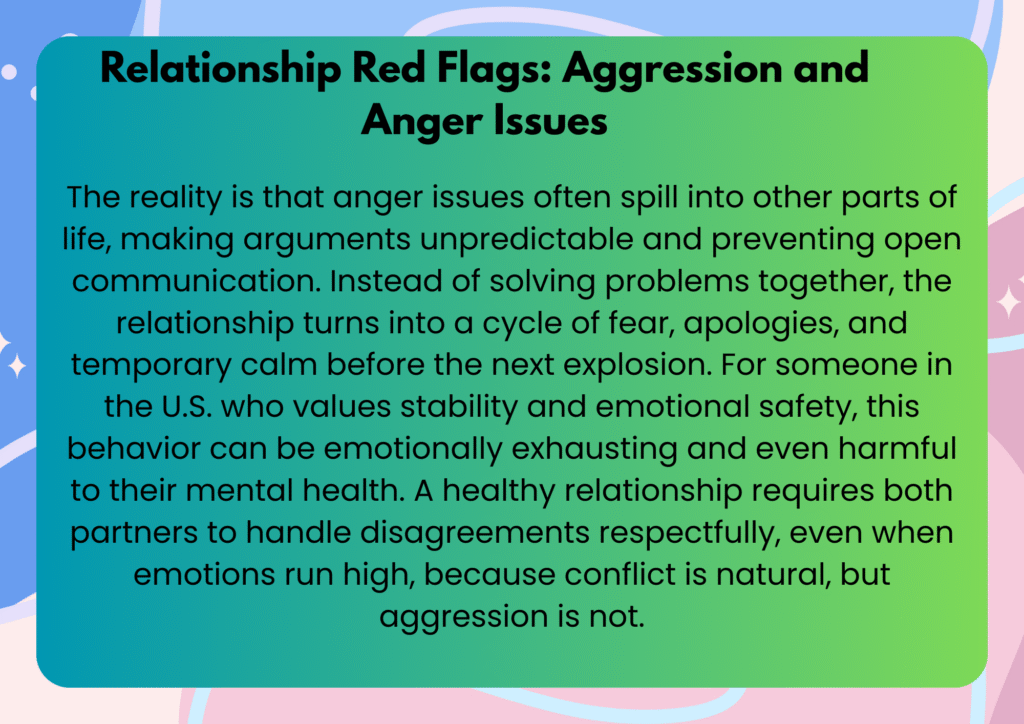
By recognizing these red flags early, women can avoid emotional pain and instead open themselves up to healthier, more supportive relationships. Love should never come at the cost of your happiness, self-respect, or safety. When something feels wrong, it’s usually because it is and walking away is sometimes the most powerful form of self-love.
Table of Contents
Why Relationship Red Flags Matter for Women
Every relationship begins with excitement, charm, and the hope of building a happy future. But behind the spark, it is essential for women to pay attention to the red flags that often appear in subtle ways. Ignoring early warning signs can lead to emotional pain, loss of self-confidence, and even toxic situations that take years to recover from. Recognizing red flags is not about being negative, it is about protecting your mental health, emotional well-being, and long-term happiness.
One common red flag is controlling behavior. For example, if a partner always wants to know where you are, checks your phone, or tries to control who you spend time with, it may feel like “love” in the beginning, but it is actually a sign of manipulation. Many women in the United States have shared real stories where this behavior started small, like a boyfriend insisting on choosing their outfits, but later grew into complete control of their daily lives. These stories show how something that looks harmless at first can quickly turn into emotional abuse.
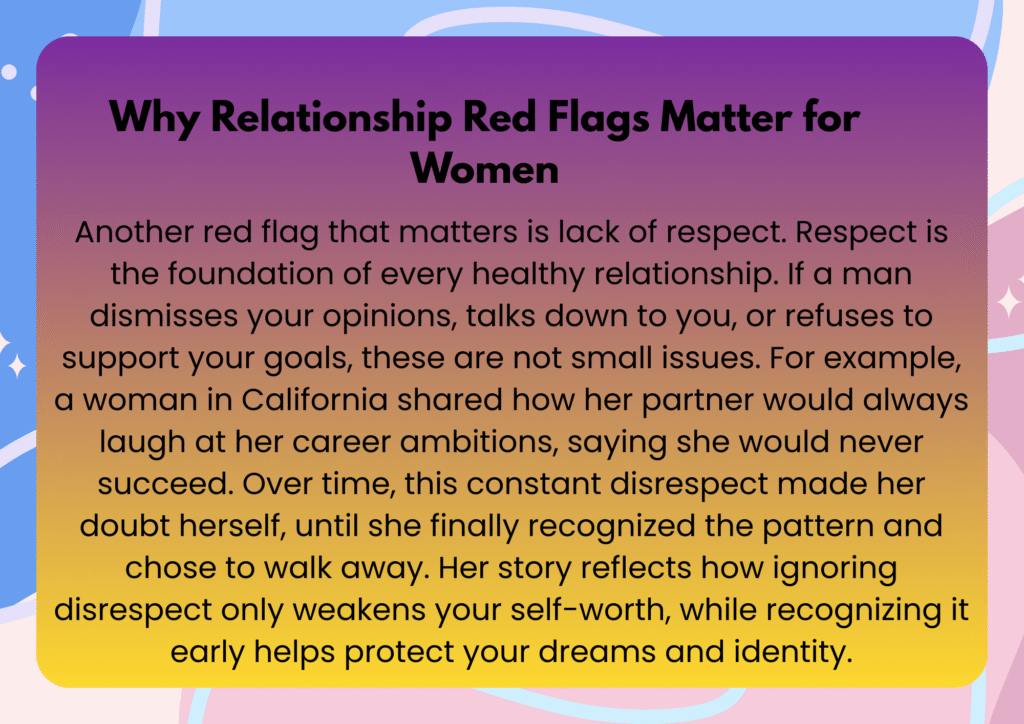
Financial red flags are another area women should never overlook. If your partner is always borrowing money, hiding spending habits, or pressuring you into financial commitments, it is a serious warning. Many American women have shared stories where partners left them in debt or used money as a tool for control. These examples show why financial honesty and responsibility are vital for a secure future together.
Jealousy and anger issues are also major signals that should not be ignored. A woman from Texas once shared how her boyfriend would get angry every time she talked to male coworkers. His jealousy turned into verbal fights and emotional stress until she realized this behavior was a danger to her peace of mind. Recognizing jealousy as a red flag, rather than mistaking it for love, can save women from toxic and unsafe relationships.
By sharing real-life examples, women can better understand why red flags matter and how small behaviors today can become major issues tomorrow. Paying attention to these signs is about choosing self-love, respect, and happiness over settling for less. Every woman deserves a relationship built on trust, equality, and genuine care. The more we talk about these experiences openly, the stronger women in the United States become in building healthy connections and avoiding toxic patterns.
Relationship Red Flags: Lack of Respect in Daily Life
In every healthy relationship, respect is the foundation that keeps the bond strong. When respect is missing in daily life, it becomes a red flag that should never be ignored. Lack of respect can appear in many forms, such as dismissive comments, constant interruptions, ignoring feelings, or making jokes that belittle a partner. Over time, these behaviors can create emotional distance and damage trust. Respect is not just about big decisions it is also about small, everyday actions that show care, kindness, and consideration.
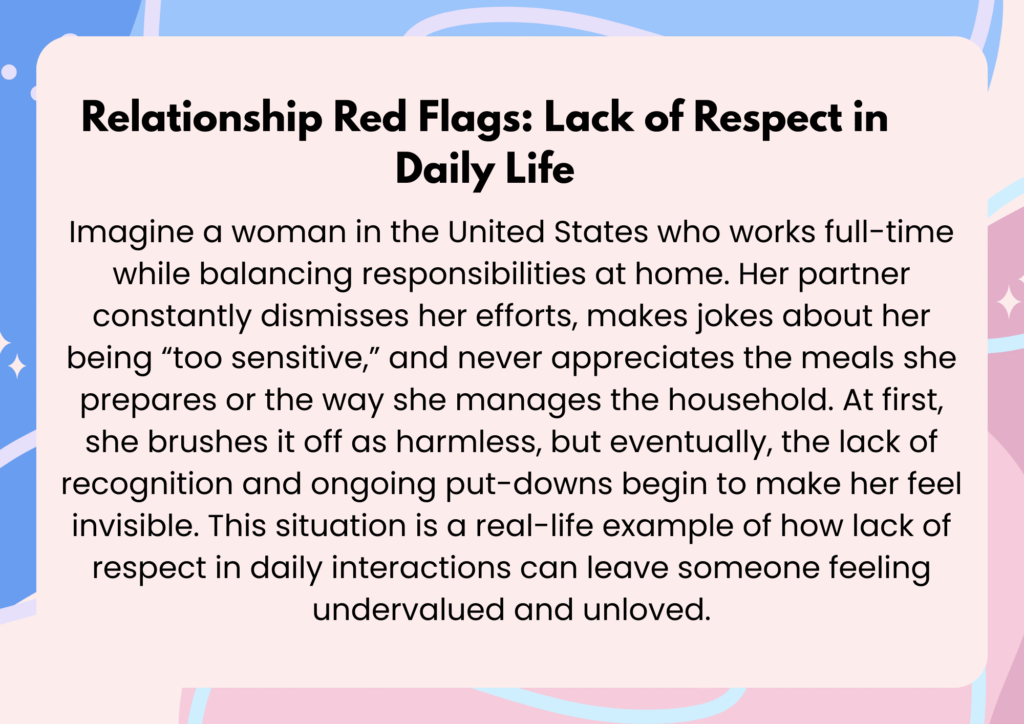
Respect in relationships means listening without interrupting, valuing opinions even when they differ, and speaking with kindness instead of sarcasm. When a partner consistently ignores feelings, dismisses boundaries, or uses a condescending tone, it signals deeper issues that cannot be overlooked. Many women in the U.S. experience this dynamic, and while it may seem like a small problem at first, it often grows into bigger conflicts, emotional burnout, and even the breakdown of the relationship.
Healthy love should never feel like walking on eggshells or constantly seeking approval. Women deserve to feel safe, supported, and heard in their daily lives. Recognizing the red flag of disrespect early on can help prevent long-term unhappiness. For example, if a woman notices her partner frequently mocks her career goals or interrupts her in conversations, it is a clear signal that respect is missing. Addressing it directly and setting boundaries is essential, because respect should not be negotiable.
Ultimately, respect is about valuing someone as an equal partner. Without it, even the strongest attraction or love cannot last. Women who notice disrespect in daily interactions should trust their instincts and understand that they deserve more than constant dismissals or belittling. A relationship built on respect creates peace, security, and happiness, while one without it leads to frustration, doubt, and emotional pain. Recognizing and addressing this red flag is one of the most important steps toward building a healthy and lasting relationship.
Relationship Red Flags: Controlling Behavior Hiding as Care
When a relationship begins, many women feel comforted when their partner shows care and concern, but sometimes what looks like love is actually control hiding under the mask of care. A controlling partner may insist on knowing where you are all the time, check your phone under the excuse of protecting you, or decide what you should wear because they claim it is for your own good. At first, it may feel like extra attention or protection, but over time, these behaviors can strip away your independence and confidence. Recognizing this red flag is important because healthy relationships are built on trust, not control.
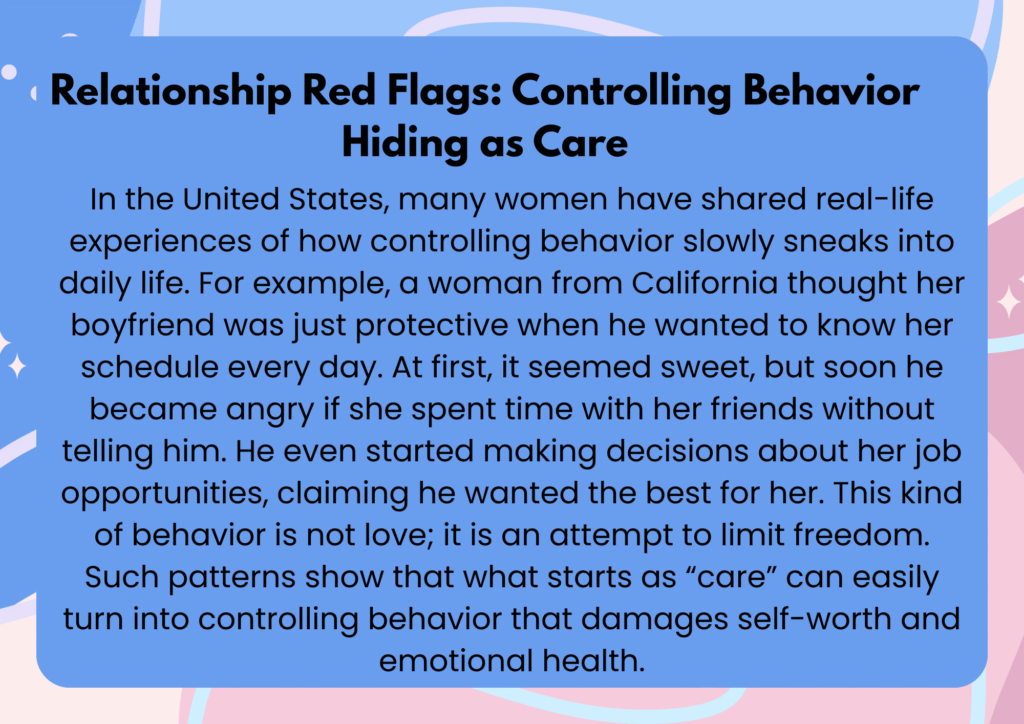
It is easy to mistake control for care because the partner often frames it as concern. For instance, saying “I don’t want you going out with those friends, they’re a bad influence” may sound protective, but in reality, it cuts you off from your support system. True care allows freedom, while controlling behavior creates guilt and fear. In the U.S., where independence and personal choice are deeply valued, women must pay attention when their partner’s concern starts to feel suffocating rather than supportive.
The step to protect yourself is learning to question the motive behind the actions. If your partner respects your boundaries, encourages your growth, and trusts your judgment, that is care. But if they use love as a reason to limit your choices, it is a red flag. Many women have found strength by talking to trusted friends, seeking counseling, or joining support groups where they realized they were not alone in facing such issues. Sharing these stories helps other women recognize when care turns into control.
Understanding this difference is essential because ignoring controlling behavior can lead to toxic patterns that are harder to break later. Women in healthy relationships in the U.S. often describe their partners as supportive without being restrictive, caring without being overbearing, and protective without taking away freedom. This shows that love and control should never be confused, and identifying this red flag early can save women from years of emotional struggle.
Relationship Red Flags: Constant Criticism That Breaks Confidence
Many women in relationships often overlook the subtle but damaging red flag of constant criticism. At first, it may seem harmless when a partner points out little flaws, like how you dress, how you talk, or even the way you laugh. Some women may mistake these remarks as attempts to help them “improve,” but over time, criticism that never ends starts to feel like rejection rather than support. In a healthy relationship, feedback should uplift and inspire growth, not break down confidence or make someone question their worth. When criticism becomes a pattern, it slowly chips away at self-esteem, leaving the person feeling like they are never good enough, no matter what they do.
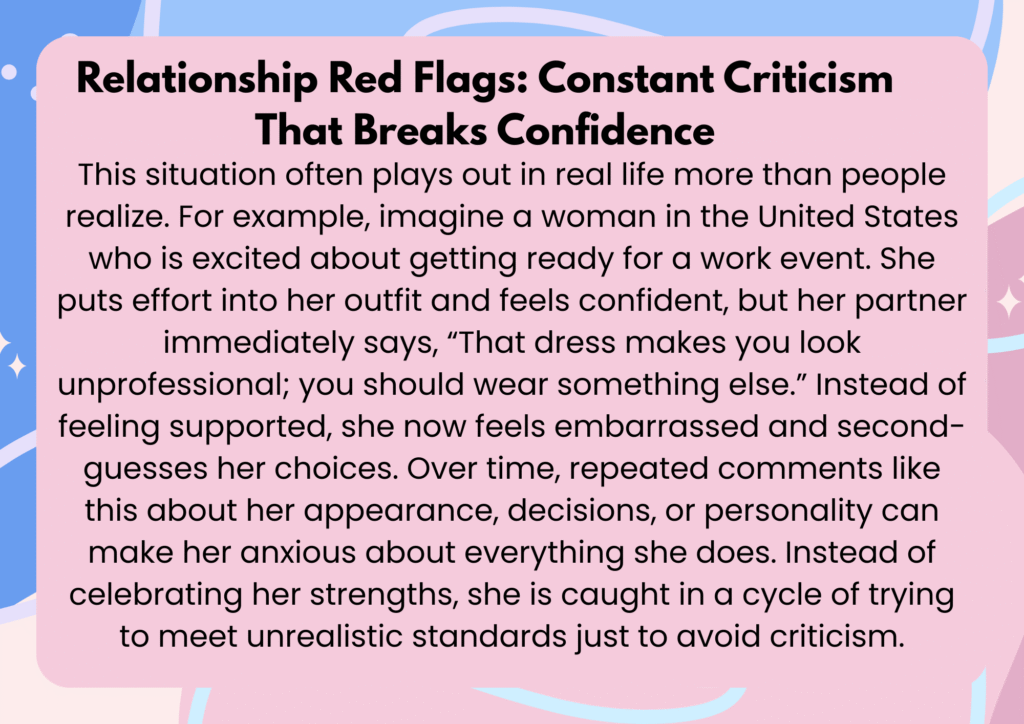
Stories like this matter because many women stay silent, believing criticism is just “part of love.” The truth is that genuine love does not demand perfection, nor does it focus on flaws. Real respect means appreciating a partner as they are while encouraging growth in a supportive way. Constant negativity creates emotional distance, damages trust, and can even push women into isolation, where they feel disconnected from friends, family, or their own identity.
Understanding this red flag helps women recognize when love has crossed the line into control. A caring partner may express concerns, but the difference lies in tone and intention. Saying, “I think you’ll shine in that outfit because it fits the occasion,” is supportive. Saying, “You always dress wrong; you should listen to me,” is destructive. Women deserve relationships where they feel encouraged, not diminished. Recognizing constant criticism as a red flag empowers women to step back, reflect, and protect their confidence before it’s too damaged. By sharing and talking about these real-life examples, more women can learn to value themselves, trust their instincts, and walk away from relationships that harm more than they heal.
Relationship Red Flags: Dishonesty and Broken Trust
When trust begins to break in a relationship, it often starts with small acts of dishonesty that seem harmless at first. A partner might tell a white lie about where they were, hide a conversation with someone else, or avoid sharing important details. Over time, these little cracks grow bigger, and what was once a bond built on honesty can quickly turn into suspicion and doubt. For many women in the United States, dishonesty in a relationship is one of the hardest red flags to ignore because it affects the very foundation of love trust. Without trust, every promise feels uncertain, and every action makes you wonder if the truth is being hidden again.
Imagine a woman in Texas who discovered her partner had been lying about financial problems. At first, he claimed everything was fine, but she noticed small signs like unpaid bills and constant excuses. When the truth finally came out, she realized the dishonesty was not just about money it was about hiding reality and avoiding transparency. That broken trust made her question everything else he had ever told her. This kind of situation is common and shows how dishonesty doesn’t just damage one part of a relationship; it seeps into every interaction, leaving the other person constantly doubting.
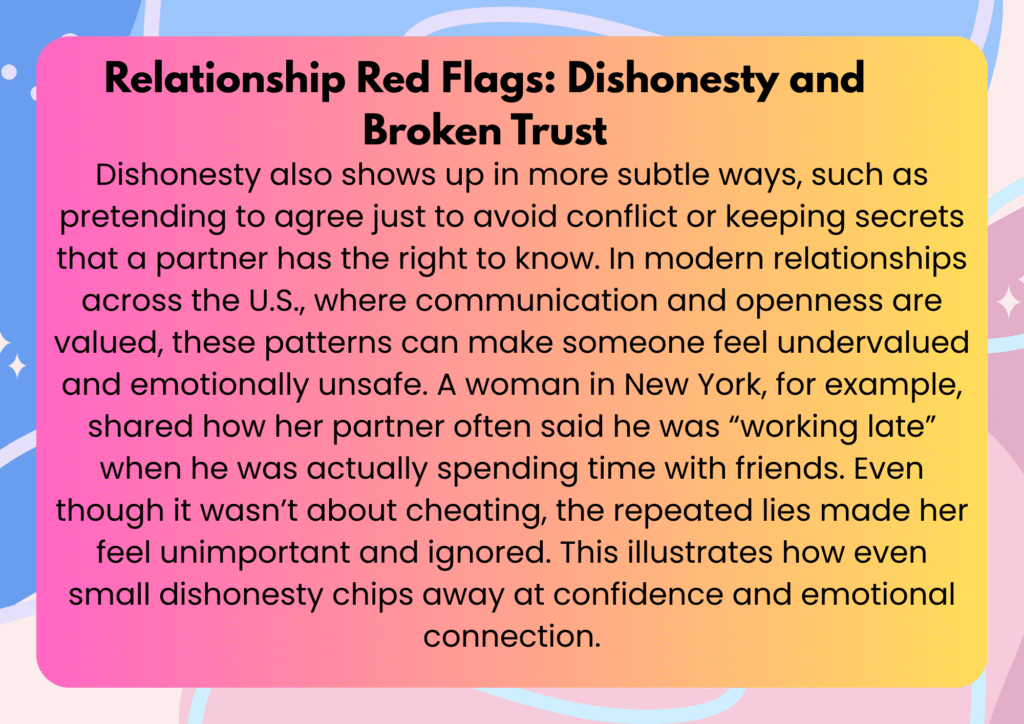
The real danger of dishonesty is that it often forces the other partner into a cycle of anxiety and second-guessing. When you constantly wonder if the person you love is telling the truth, it drains your energy and lowers your self-esteem. A healthy relationship thrives on trust, honesty, and reliability. If those values are missing, no amount of apologies can fully repair the broken foundation. Recognizing dishonesty as a red flag is not about being overly suspicious it’s about protecting your emotional health and ensuring you are in a relationship where your trust is respected. For women across the United States, understanding this red flag early can help them make stronger choices and avoid deeper heartbreak.
Relationship Red Flags: Communication Shutdowns
When it comes to building a strong and healthy relationship, communication is the foundation that keeps everything connected. Without open and honest communication, couples can easily drift apart. One of the biggest relationship red flags is a communication shutdown, where one partner stops engaging in meaningful conversations and instead chooses silence, avoidance, or dismissiveness. At first, it might seem like a small issue, such as one person walking away during an argument, but over time, these patterns create distance, confusion, and a lack of trust. Many people in the United States face this challenge in relationships, especially when life gets busy with work, family, and personal stress, but ignoring it only makes things worse.
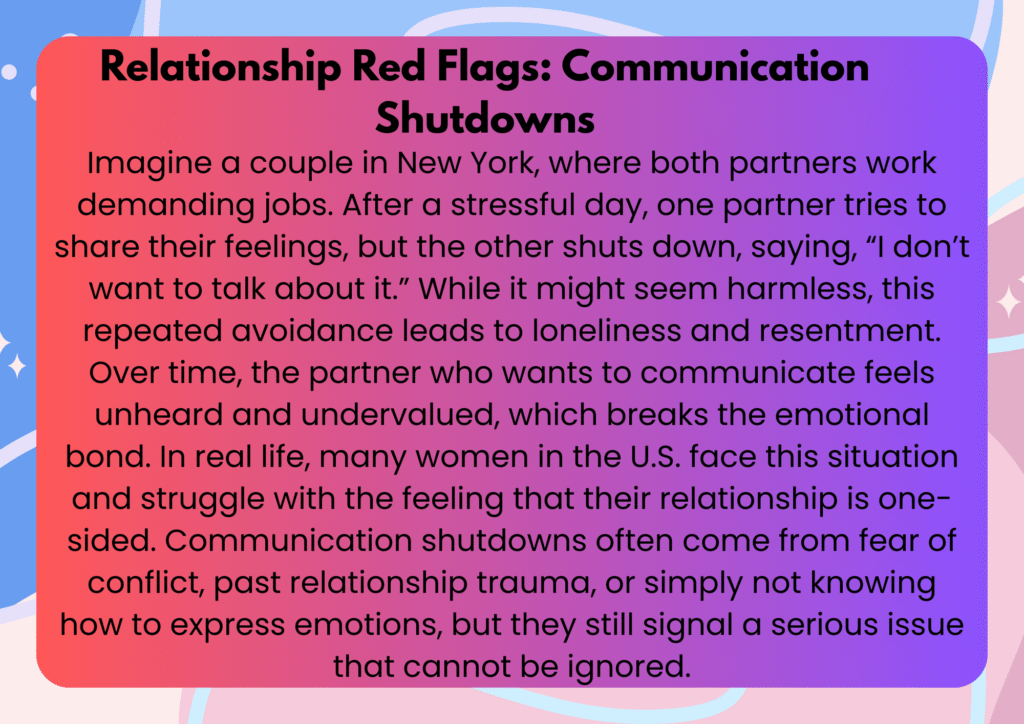
The danger of these shutdowns is that they leave problems unresolved. For example, a woman in California may notice that her partner goes silent every time money issues come up. Instead of solving the financial stress together, the silence leaves her carrying the burden alone. This is not just frustrating it’s unhealthy. Relationships thrive on teamwork, but when one partner avoids communication, the other feels abandoned. That lack of support creates bigger arguments later, and the silence becomes even harder to break.
To overcome this red flag, couples need to recognize that silence is not a solution. Healthy communication means listening without judgment, speaking with honesty, and being willing to work through uncomfortable emotions. Many successful couples in the U.S. make time for open conversations even when life feels overwhelming. By practicing patience and respect, partners create a safe space where both voices matter.
A communication shutdown is never just about silence it is about the message it sends: “Your feelings don’t matter.” Recognizing this red flag early gives women the power to protect their confidence, set healthy boundaries, and decide whether the relationship is truly supportive. Real love requires both partners to talk, listen, and grow together, and when that balance is missing, it is a warning sign no woman should ignore.
Relationship Red Flags: Jealousy and Possessiveness
Jealousy and possessiveness in relationships may seem small at first, but over time they can create serious problems that affect trust, freedom, and emotional well-being. Many women in the United States experience situations where a partner’s jealousy feels like love, but in reality, it turns into control. For example, if your partner constantly checks your phone, questions who you are talking to, or gets upset when you spend time with friends, that is not care it’s a red flag. A healthy relationship is built on trust and respect, not suspicion and control.
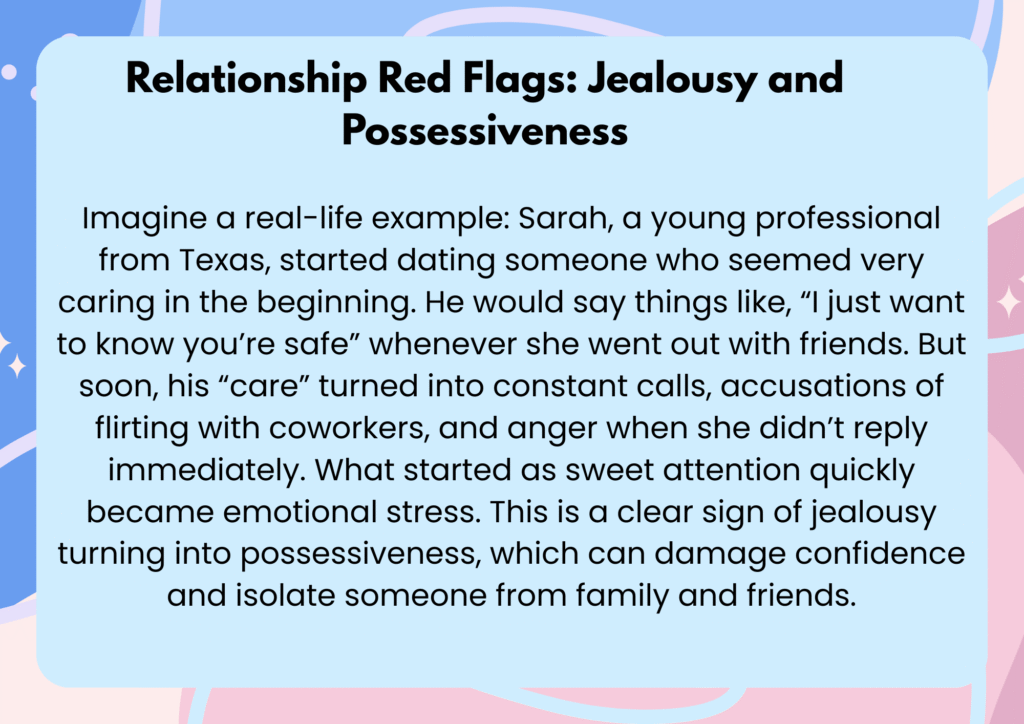
These situations are more common than many realize. A partner may disguise jealousy as love by saying they “can’t live without you” or by making you feel guilty for having your own life outside the relationship. But love should never feel like a cage. Women in the U.S. deserve relationships that allow them to grow, pursue goals, and maintain friendships without fear of conflict. A partner who trusts you will celebrate your independence instead of trying to control it.
If you notice patterns of jealousy and possessiveness in your own relationship, it’s important to step back and evaluate whether the behavior is truly love or a warning sign. Many women find that once they identify the red flag, they can take healthier steps, whether it means setting boundaries, having an honest conversation, or walking away before things escalate. Recognizing jealousy and possessiveness as red flags is not about giving up on love it’s about protecting your peace and building a relationship where both partners feel secure and respected.
This story-driven understanding helps women see that they are not alone and that many in the United States face the same challenges. By sharing real-life scenarios, it becomes clear that jealousy and possessiveness are not signs of passion but signs of control. Women who value self-respect, freedom, and healthy love should pay attention to these behaviors early on and never ignore them.
Relationship Red Flags: Lack of Support in Hard Times
When you are in a relationship, one of the most important signs of love and commitment is the support you receive during difficult times. True partnership is not only about enjoying the good moments but also standing strong when life gets hard. A clear red flag in any relationship is the lack of support in hard times, because that is when you see someone’s true intentions. If your partner is present only when life is easy but disappears emotionally or physically when challenges come, it signals an imbalance in the relationship. This behavior shows that they may not value your struggles or lack the willingness to invest in your emotional well-being, which can leave you feeling alone even while being with someone.
Support does not always mean solving every problem; sometimes, it means simply listening, offering comfort, or showing patience. For example, many American couples share stories of how they grew closer when one partner stood by the other during tough moments like financial stress, family conflicts, or health scares. Those who have supportive partners often describe feeling stronger together because challenges brought them closer instead of pulling them apart. On the other hand, when a partner fails to show up during these moments, it often leads to resentment and doubts about the relationship’s future.
Paying attention to this red flag is vital because everyone deserves to feel valued and supported. A relationship should be a partnership where both people uplift each other. If you notice a pattern where your partner consistently ignores or minimizes your struggles, it is a sign that you may need to reevaluate whether the relationship is healthy for you. Support in hard times is one of the strongest foundations of love, and without it, the relationship risks becoming one-sided and emotionally draining.
Relationship Red Flags: Boundary Violations
Sometimes in relationships, the most dangerous red flags are the ones that seem small at first but grow bigger over time, such as boundary violations. Boundaries are the invisible lines that protect a person’s comfort, values, and individuality, and when someone constantly ignores or crosses those lines, it creates an unhealthy and disrespectful dynamic. In the beginning, it might show up as something as simple as your partner reading your text messages without asking or showing up at your workplace unexpectedly. While they may frame it as love or care, the truth is that these actions signal a lack of respect for personal space. In the United States, where individual independence is highly valued, many women find it especially uncomfortable when their privacy is dismissed in the name of closeness.
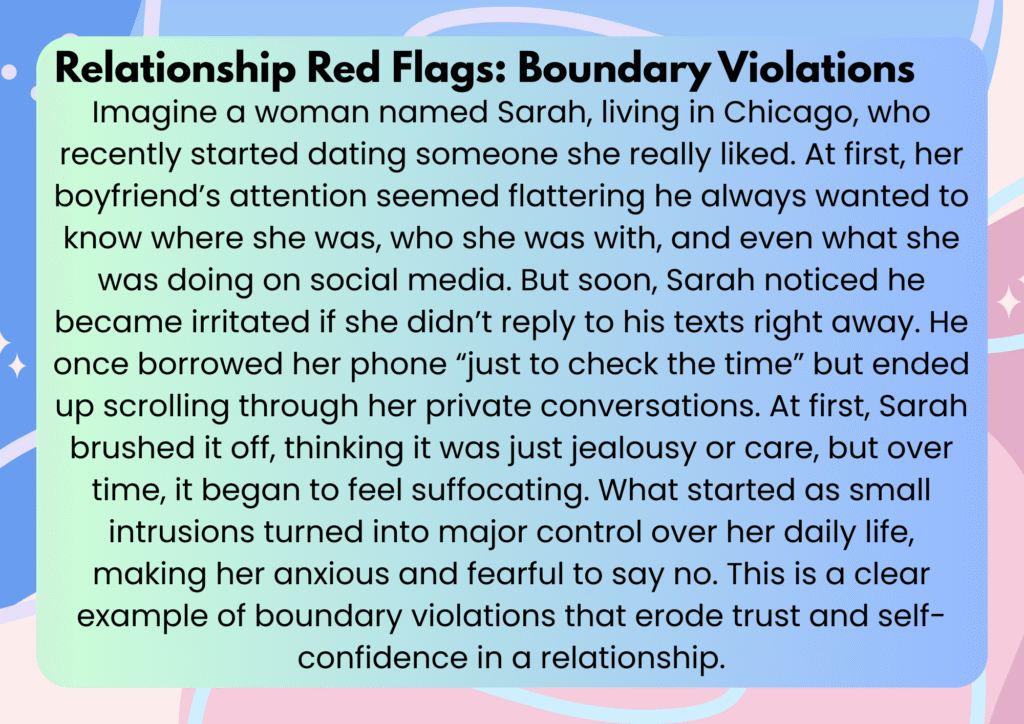
For many women, especially in the U.S., boundary violations can look like partners pushing for more intimacy than they are comfortable with, dismissing feelings when they say “no,” or even controlling finances without consent. These behaviors strip away personal freedom and create emotional damage. Respecting boundaries should never be optional; it’s a basic requirement for a healthy and supportive partnership.
When reading real stories like Sarah’s, it becomes clear that these warning signs should not be ignored. A healthy relationship thrives on trust, respect, and communication, where both partners feel safe and valued. If you notice that your partner consistently dismisses your limits, it’s not a sign of love it’s a red flag. Recognizing boundary violations early gives you the power to protect your well-being and build relationships that honor who you are.
Relationship Red Flags: Aggression and Anger Issues
Sometimes relationships reveal hidden red flags that are easy to dismiss in the beginning but become damaging over time, and one of the most concerning signs is aggression and anger issues. At first, it may appear as small outbursts or short tempers that seem harmless, but over time these behaviors can escalate and create an unhealthy environment. When a partner cannot manage their anger, it often leads to yelling, harsh words, or even intimidation that leaves the other person feeling unsafe or constantly on edge. This type of behavior not only erodes trust but also damages emotional well-being because it replaces love and respect with fear and tension.
Imagine a young couple in the United States where one partner becomes frustrated over minor issues, such as being late to dinner or forgetting to run an errand. Instead of calmly expressing feelings, the partner explodes in anger, slamming doors or raising their voice to the point where the other person feels anxious about making even small mistakes. Over time, this pattern makes the relationship feel less like a partnership and more like walking on eggshells. In real life, many people stay in these situations, convincing themselves that the anger is just stress or pressure from work, but the truth is that unchecked aggression is a serious red flag that cannot be ignored.
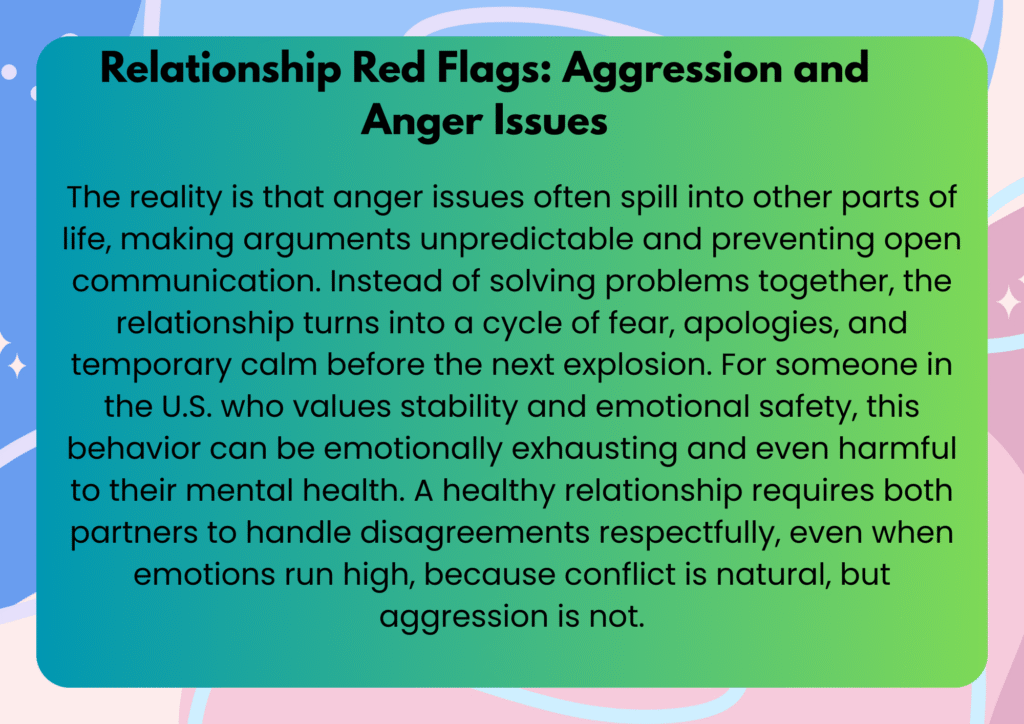
What makes this red flag especially dangerous is how it chips away at self-confidence. Many people start to believe they are the problem or that they need to change in order to avoid triggering anger, when in reality, no one should feel responsible for another person’s inability to control their emotions. If someone notices repeated patterns of aggression, it is a clear sign to step back and evaluate the relationship seriously. Emotional security should never be compromised for the sake of keeping the peace.
Recognizing these warning signs early can protect people from long-term harm and help them make healthier choices in love. In the U.S., where mental health awareness is growing, more individuals are learning to prioritize respect, patience, and kindness in their relationships. Aggression and anger issues are not simply bad habits they are warning signals that a relationship may not be safe or sustainable. By paying attention to these behaviors and valuing their own emotional well-being, people can avoid staying in toxic situations and move toward building connections that are grounded in trust and care.
Relationship Red Flags: Emotional Manipulation
Sometimes in relationships, emotional manipulation can be difficult to recognize because it often appears in subtle ways. It usually involves one partner using guilt, fear, or control to influence the other person’s thoughts and actions. For example, someone might constantly say things like, “If you really loved me, you would do this for me,” or they may play the victim to make their partner feel guilty for setting boundaries. Over time, this creates an unhealthy dynamic where one person feels trapped, confused, or pressured into decisions they never wanted to make. Recognizing this red flag early is essential because emotional manipulation can slowly break down confidence and self-worth.
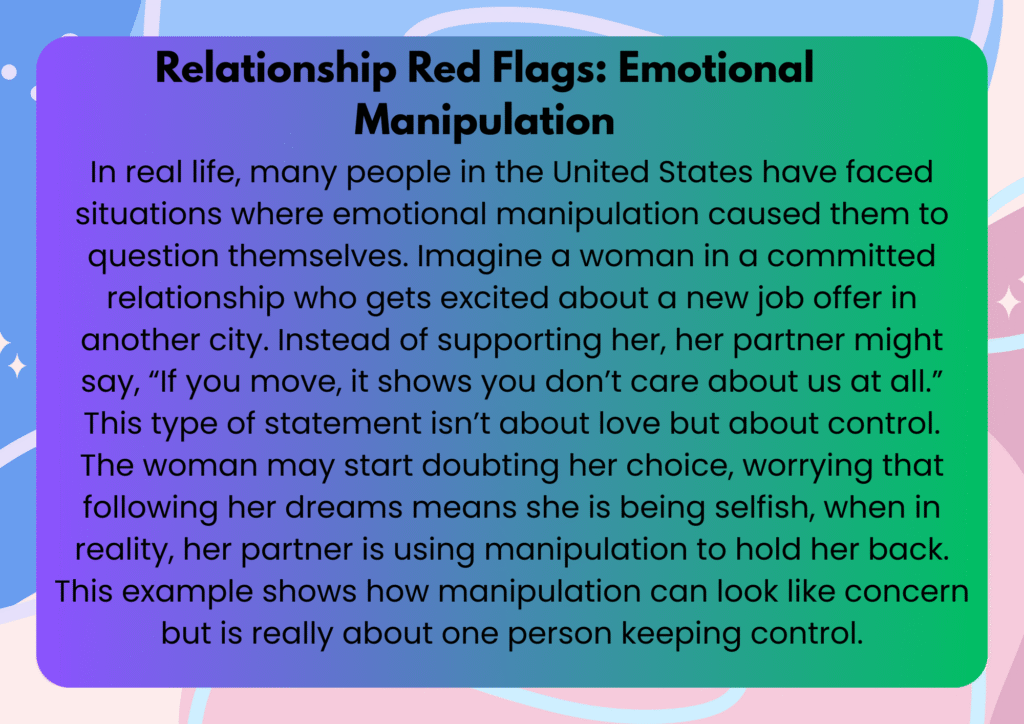
Another common situation in U.S. relationships is when a partner constantly threatens to leave or withdraw affection if things don’t go their way. For instance, if someone says, “I’ll break up with you if you hang out with your friends tonight,” that’s not love it’s emotional blackmail. Over time, this behavior makes the other person fearful of losing the relationship, so they give in to demands instead of making decisions freely. Healthy relationships are built on trust, respect, and support, not pressure and fear.
Learning to identify manipulation is empowering because it allows people to protect their emotional well-being. A strong relationship should encourage personal growth, independence, and happiness, not make someone feel guilty for living their life. If someone notices these red flags, it’s important to take them seriously and seek support, whether by confiding in friends, talking to a counselor, or setting firm boundaries. By recognizing emotional manipulation for what it is, individuals can make healthier choices and build relationships that are supportive, loving, and respectful.
Final Thoughts: Choosing Love that Heals, Not Hurts
Love is meant to feel safe, supportive, and healing, yet many people in relationships often find themselves in situations where love brings more pain than peace. Choosing love that heals, not hurts, begins with recognizing the difference between a relationship built on respect and one built on control or fear. Many individuals in the United States face this challenge, as relationships can sometimes look perfect on the outside but feel draining on the inside. It is not about seeking a fairytale; it is about building a connection where both partners feel valued, heard, and uplifted instead of silenced, judged, or torn down.
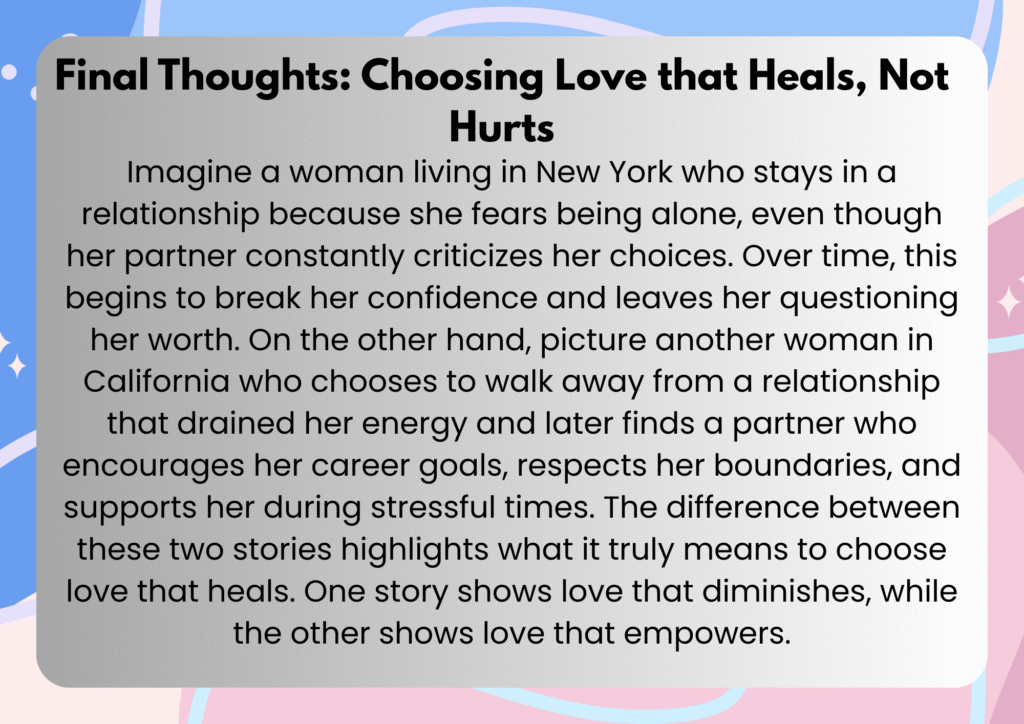
Healing love is not about perfection, but about effort, compassion, and growth. In healthy relationships, disagreements happen, but instead of shutting down or lashing out, both people work through challenges with patience. For many readers in the U.S., these qualities may look like a partner who supports you when you’re struggling at work, respects your independence, or simply listens when you need to talk without making you feel guilty. These everyday acts create emotional safety and trust, which are the true foundations of lasting love.
Choosing the right relationship often means being brave enough to let go of what hurts. While walking away can feel difficult, especially when years and emotions are invested, it is often the first step toward experiencing a love that restores joy rather than takes it away. Many people who make this choice find themselves happier, healthier, and more confident because they learn that real love strengthens you instead of breaking you down.
At the end of the day, love should feel like a source of healing, not a cause of pain. When you choose love that uplifts you, you’re not only building a stronger relationship but also creating a better life for yourself. Every person deserves to experience a connection where love feels safe, supportive, and freeing. The choice comes down to recognizing your worth and deciding that love should be something that heals your soul, not something that leaves scars.
Summary Table: Relationship Red Flags & Solutions
| Red Flags | Lack of Respect | Control & Possessiveness | Constant Criticism | Dishonesty | Poor Communication | No Support | Boundary Violations | Aggression | Emotional Manipulation |
|---|---|---|---|---|---|---|---|---|---|
| Impact | Low self-worth | Loss of freedom | Broken confidence | Shattered trust | Emotional distance | Feeling alone | Loss of safety | Fear & harm | Doubting yourself |
| Solution | Walk away, demand respect | Set boundaries, seek help | Reclaim confidence | Confront, exit if repeated | Encourage talk, don’t accept silence | Seek supportive partners | Say no, leave if ignored | Exit immediately | Recognize & trust instincts |
Publish by: Woman One Network | w1network
At Woman One Network, we believe every woman deserves a love story rooted in respect, freedom, and joy. Our mission is to empower women with knowledge, self-worth, and the courage to walk away from toxic love. By learning to recognize relationship red flags, you protect not only your heart but also your future. Together, let’s build relationships that celebrate women, not silence them.

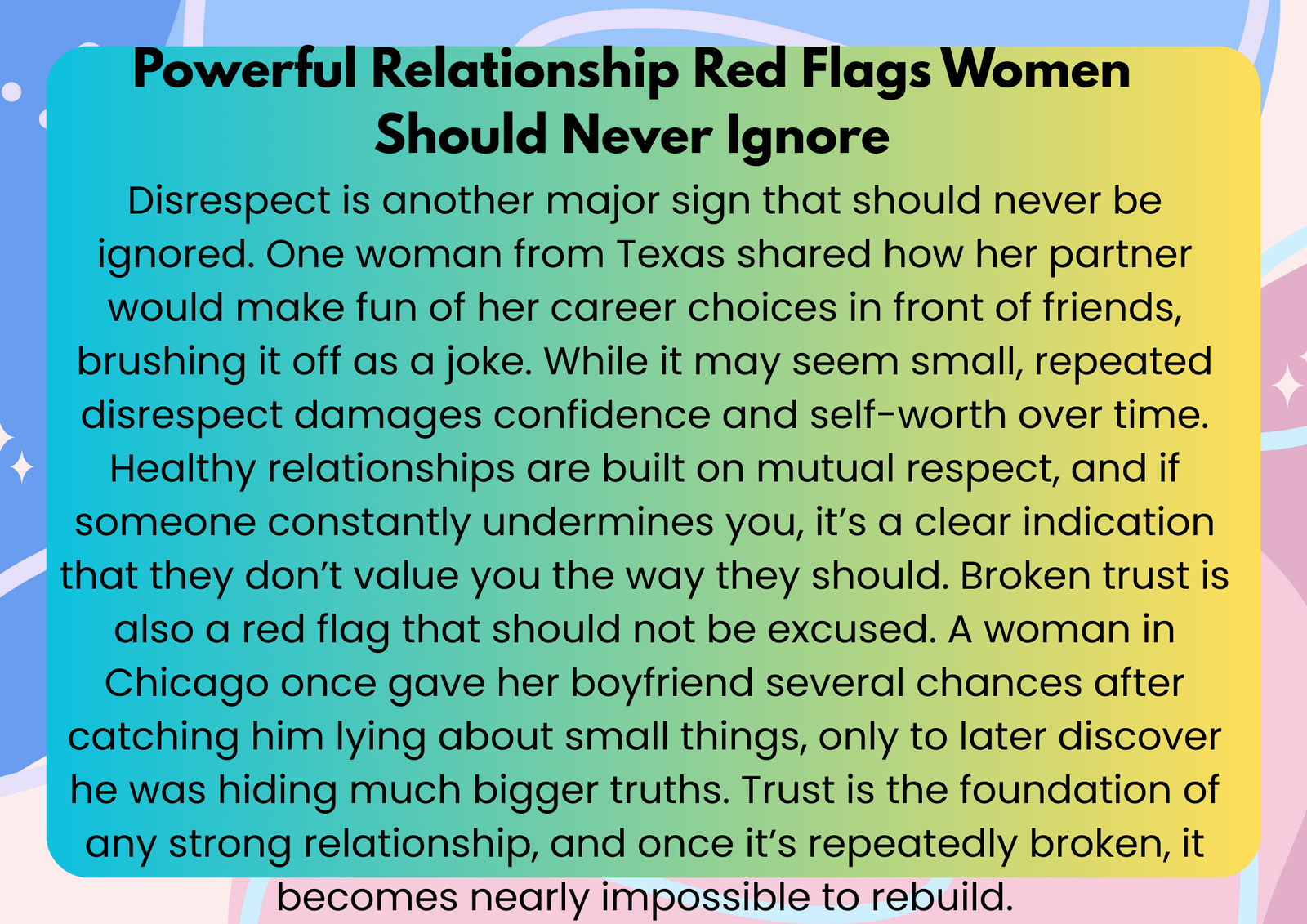

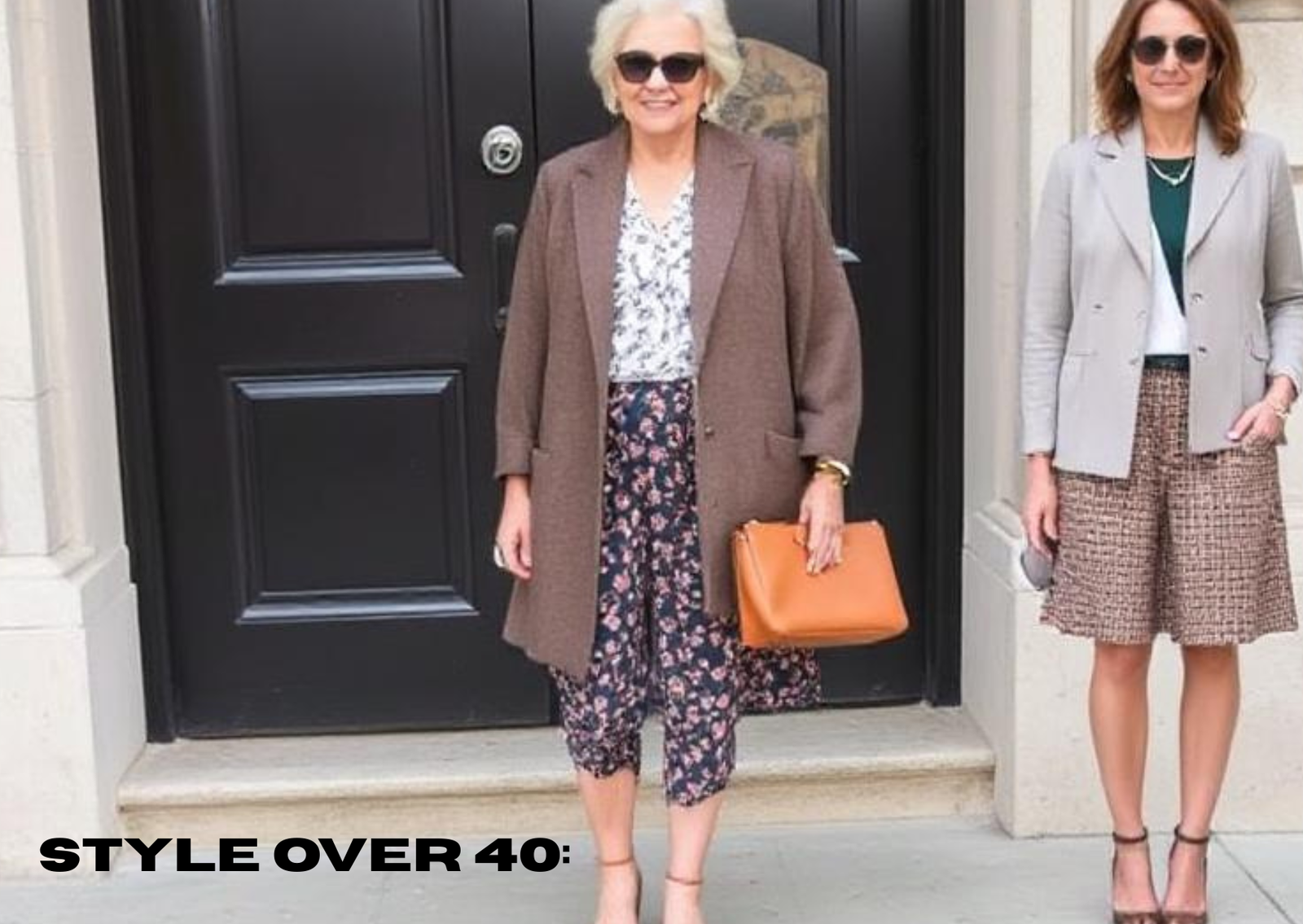

Can you be more specific about the content of your article? After reading it, I still have some doubts. Hope you can help me.